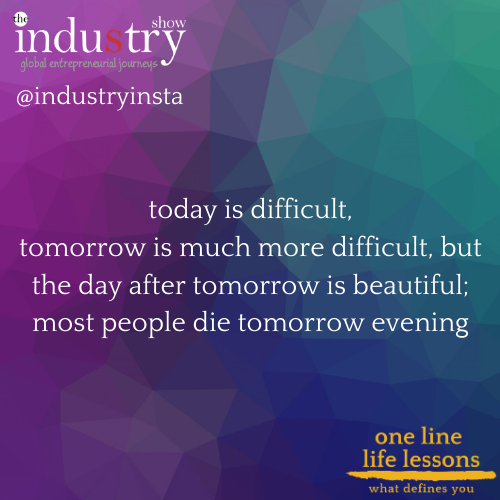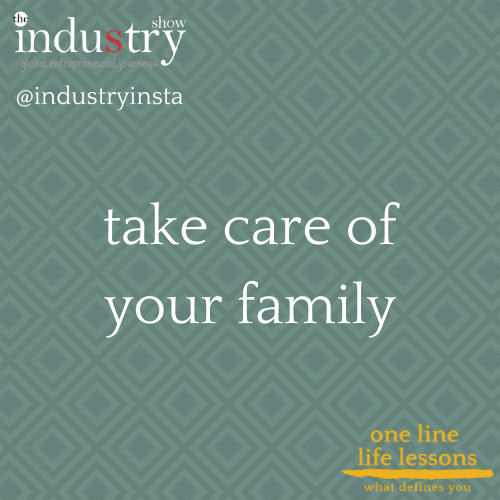APR 27, 2024
Pranjal Modi
Pranjal Modi is the driving force behind TITLI, a social enterprise committed to transforming early childhood care and education (ECCE) by empowering women as skilled early childhood educators and caregivers. With a bold vision to train 2 million women as Early Childhood Professionals by 2035, Pranjal oversees a multifaceted approach that includes comprehensive skill development programs in urban and rural areas. Through initiatives like teacher training programs and partnerships with organizations such as Piramal Foundation and UN Women, TITLI is not only building a strong workforce of early childhood educators but also establishing rural pre-schools to ensure equitable access to quality education in remote regions. Pranjal’s unwavering belief in the transformative power of investing in early childhood underscores his dedication to creating lasting social impact through TITLI’s initiatives.
One Line Life Lessons from Pranjal





Episode Highlights
- Titli founded to train rural educators: 2:30
- Goal: Reach 2 million educators, improve learning outcomes: 4:15
- Challenges in Indian education system discussed: 6:00
- Importance of budget allocation for early childhood education: 7:45
- India’s new education policy integration: 9:30
- Pandemic challenges addressed through successful initiatives: 11:15
- Impact of training Anganwadi workers on children: 13:00
- Community ownership and transformative potential highlighted: 15:00
- Investing in early childhood education for future leaders: 17:00
- Personal life lessons on family, health, and overcoming fears: 19:00
Show Transcript
Transcript - Full Episode
Nitin Bajaj
Hey, everyone. Welcome to the industry show. I’m your host, Nitin Bajaj. And joining me today is Pranjal Modi. Pranjal, welcome on the show.
Pranjal Modi
Thank you very much, Nitin. It’s absolute pleasure and privilege to be a part of the show. Thank you very much for having me on the show.
Nitin Bajaj
It’s wonderful to have you here, Pranjal. Let’s start with that question. Who is Pranjal?
Pranjal Modi
Pranjal is someone who really loves reading, loves traveling, especially to rural areas. That’s also the place of work, Traveling, talking to people, how their lifestyle and their very simple lifestyle and culture is. And I personally enjoy eating laddoos, Indian sweets laddoos, and pan. I’m a fan of pan. I grew up in Ranchi. That’s a city in Jharkhand, and I was influenced by my great grandfather, Nagar Malji Modi. So he was a freedom fighter, a social reformer, and a very seasoned businessman, entrepreneur. And I was fortunate to grow, to grow up in a family which fulfilled all my needs, of food, clothing, and shelter. And that, germinated a desire to contribute to large scale social change from the very beginning. And it so happened that I started, in Bombay as a finance professional and then steered my way into, grassroot foundational education because I thought that was much more effective use of, my time and energy in this life.
Nitin Bajaj
From the first time we connected and spoken, I’ve learned more about you. This question and you touched upon it, and I would love for you to go deeper into it. You could have done so many different things with the the esteemed privileged background you’ve had from your great grandfather down to your family. And before you you jump into the details, first, tell us what Titli is and why did you start this? What happened? What was that trigger? What was that moment that led you to say, I’m gonna leave everything behind and this is going to be my focus?
Pranjal Modi
Thank you for that question, Nathan. Tiddly is an institution to help government create a sustainable machinery to train early childhood educators and caregivers at scale. So what happened was that, I did my education. I did my CACFA from Bombay, and then I was, working as a finance professional, and then I started teaching CA students. While I was teaching CS students, I realized that they want certification. They are slightly less interested in learning. And then I started teaching class 12, 11, 10, 9 students. And then that trigger happened. It was Jagriti at 8,000 kilometer train journey, which kind of changed me completely. It it gave me the access to real India, the villages, the education ecosystem. And that’s when I realized that foundation education is possibly the single most important thing that’s needed, which can help the curiosity stay alive in children and eventually help children be prepared, for for formal schooling. And as it goes, we did not have a machinery to help teachers in that ecosystem, and that’s the reason I decided that I’ll concentrate my energies into early childhood education capacity.
Nitin Bajaj
Yeah. It’s truly commendable what you’re doing. And I cannot applaud you enough for doing that. It’s the youth. It’s the next generation that can take on the challenges we have and make a real difference and and really move the needle. So congrats again on on being able to make that decision and and do this. Now tell us more about Titli. What’s the mission? What’s the vision? And what’s the impact you and the team have been able to create so far?
Pranjal Modi
At Titli, then our vision is to we are working towards having a world where every child has a responsive caregiver. That’s and our personal our our kind of team vision, our mission is to help at least 2,000,000 early childhood educators over the next 2 decades. That’s something that we are working towards as an organization. Until now, we have, worked with 7 and a half 1000 early childhood educators Nitin rural and urban areas. We work in Jharkhand, Maharashtra, UP, Telangana, these are states in India. And based on our intervention, we see at least 150,000 children having 30 to 40% improvement in their learning outcomes.
Nitin Bajaj
Nice.
Pranjal Modi
2 to 2.5 times improvement in attendance in the rural preschools and day cares that we work with and, unquantifiable improvement in the confidence level, self respect, and the self worth of rural early childhood caregivers who are possibly the most underappreciated and, underpaid resources of government in this mission.
Nitin Bajaj
These are such impressive numbers. And, Pranjal, this is the true change. This is where it starts. Right? This is the genesis of transformation. So, again, kudos to you and your team. I know you have a a long way ahead, but the cool thing about this is there is a lot of multiplier effect that kicks in. And when you see the elder siblings seeing a change Nitin results, it inspires the others in the family. It draws in the parents, and there is such an engagement that social fabric starts to kick in. So it’s extremely it’s an extreme joy for me to hear. As you were speaking, I couldn’t stop smiling to because I’ve been there. I’ve seen the children that have struggled because of lack of proper education, proper attention, proper facilities. So it’s really commendable and brings me a lot of joy to know and see that someone who’s there and has decided to take this on is starting to see a lot of traction and results. Really happy. Thank you.
Pranjal Modi
If I just take a minute, Nitin, just elaborate on on that a bit. So what happens is that in early childhood really helps you to build the foundations of learning. So just for example, if you don’t know number values, if you don’t know the value of 1, you don’t know the value of 2, Mhmm. If you don’t know the sound of a, b, c, d. When you go in class 1, you can’t do additions. You can’t do word formation. Just an example. So when you don’t have that preparation in the preprimary levels and then you go to primary, then the entire system falls apart.
Nitin Bajaj
Mhmm.
Pranjal Modi
Because the primary doesn’t have the ability to teach number values or to teach you sounds at times. And then they are in a hurry to finish their syllabus. And that hurry, you are never able to and that’s why we have these ASR reports and significant databases saying that even in class 2, class 5, people don’t have any, learning or numeracy skills aligned to their age group. So just a context there.
Nitin Bajaj
Yeah. And to add to that, just being in the system and having worked in this space just to provide the sense for our audience. We’re not talking small numbers. Right? Close to 250,000,000 children at risk of never learning and never being able to catch up, which leaves a significant gap in their careers and what they’re able to accomplish and what they’re able to bring into their families. So, again, significant work and a lot that needs to happen in the ecosystem. And more people can join hands and and work on this, the better we can make that transformation. Again, kudos to you. Now you’re working across many different systems, people, bureaucracies at times, and a lot of people that may not like the sound of something is not working and we are here to change and and make an impact. From all of these, what’s the one big challenge you would like to call out?
Pranjal Modi
The biggest challenge right now is that we have in India 4% of our budgetary allocation to early childhood education. So India has roughly around 72,000 crores spent in education and roughly around 3 to 3 1,200 odd crores is spent in early childhood education. In our understanding, it needs to be at least 10%, if not Nitin not less. So that’s the single largest constraint and coupled with severe lack of courses in early childhood education. You don’t have teachers. You don’t have trainers. So people don’t understand the value of early childhood education. They just equate it to play some sort of fun. So these 2 and that is not possibly at the higher level. At the higher level, people understand. But at the lower level, at the district level, at the state that we’re gonna have to implement, they just don’t understand what it means. Why is it important? So I think these 2 combined are severe constraints, which which kind of drag onto the system.
Nitin Bajaj
Yeah. And with these things, it’s awareness, but it’s also you sometimes hitting your head on the wall. And it takes time. It takes consistent effort and for the other people to come around. You mentioned the ASSA report, which has done a great job of bringing that awareness, but awareness is one thing. Acceptance is another thing. So you need to have both. Now as we talk about challenges, I would love to take a moment and talk about the opportunity, right, which excites you, which makes you want to continue, deal with all of the challenges you face on a day to day basis. What’s that one that, you wanna really highlight for us?
Pranjal Modi
So, Nitin, what happened in 2020 was really transformational 2021 is that India came out with a new education policy. And till now, just for the context of, the audience, early childhood education was always under the Ministry of Women and Child Development. It still is. And education under the Ministry of Education. So primary education is in 6 years and above. Mhmm. So there were this conflict, the split. So ECCE and primary education were 2 brothers who were not talking to each other, brother, sister, siblings. And new education policy was the first comprehensive education policy, which focused on overall education, and 50% of it was focused on early childhood. So that’s where the government took a very comprehensive approach that EC is a part of continuing education. And that’s where we also see the largest opportunity because India has 1,400,000 Anganwadis. And Anganwadis are dual childcare cum nutrition centers, which cater to more than 90,000,000 children. And it’s basically the largest early childhood program in the world. Mhmm. And government’s focus to this also brings in an opportunity to train these 3,000,000 women who are tirelessly working towards helping these 90,000,000 children and families to create a very strong foundational years for themselves. So, yes, that’s something that we are really excited about. There are multiple projects we are doing in this area and completely kicked about it.
Nitin Bajaj
And you’re transforming entire countries, not just within India. Right? 90,000,000 children, which will go on to become leaders and are essentially the next generation to come. And many countries don’t have that kind of population. So, again, huge opportunity, and I’m glad you are in there working on all of this and there to make a change and and improve all of this. Now as we look forward, I’d love to take a look back in time in your career, in your personal life. I would love for you to share 2 moments. 1 where things did not work out as you had expected. There was a failure, a lesson, and another one that worked beyond your imagination and expectations. So please share a couple of these moments with us.
Pranjal Modi
Something that kind of did not work and was very challenging for us was COVID. Because and or as it was for the entire world. But during COVID, what happened in India, the Aganwadi’s were shut. It’s for 24 months. And we were not able to use technology also because the Aganwadi’s, a lot of them are located in tribal rural areas. They don’t have electricity. Leave aside, Internet. So we were completely in a sense of paralysis. We did not know what to do. So and and and I feel we also somewhere became slightly conservative in that time, and our funds also completely stopped. So we were like, I don’t know whether we’ll survive the next 2 years. And somewhere, I think, looking at in hindsight, that we should have possibly have invested much more and gone all out, but I think that was one time where we became extremely we are totally scared to say the least. But it was something that, in hindsight, gives a lot of realization that when there is a crisis, we should bump up and go beyond what is visible to the naked eyes. So that was something which, you know, which stays with us as a team and and as an individual. And the success story is that just followed after COVID, which has made things kind of, all all worthwhile is we tried a new model, Nathan. We we tried a Modi of, training Aung and Wari workers and helping them, facilitate creating centers of excellence and helping them create small cohorts of 4 to 5 rural early childhood centers. And, suddenly, that has worked beautifully well. Today, we are working with 750 young and worried in this district where we are helping at least 20,000 children, and it’s a breeze. We have parents coming in. We have fathers coming in. We have grandfathers coming in. There are innumerable preprimary schools who have started complaining that now children don’t come to us. They go to. We have we have Aungenwadi workers who say that our respect has increased so much that people who used to call us thieves, who used to abuse us are today coming and and touching our feet. And I’m just so happy that that we are making our children learn. So I think this is something that, we were really working towards. And I think, this is one sustainable model that we have been able to discover after 5, 6 years of work, which can work in the government ecosystem and can be frugal and at the same time drive change in the long term because it is owned by the community over a period of time and something that doesn’t drag on the government resources. And it’s very practical and implementable. So I think that’s that was a wow moment for us, and it has really made us feel happy and satisfied and also has given us a way of hope that there is a model sustainable that can be scaled up.
Nitin Bajaj
Pranjal, congratulations and kudos to you and your team. I can only imagine the joy you must have when you see these things transform. And in our culture, we only touch someone’s feet when there is utmost respect and value for the work they do. And to see their children enjoy and want to spend more time within these that did not have the previous respect and confidence. That’s a huge transformation. So amazing work. Now as you’re in the midst of all of these things and transformations, what’s the one thing you do to take a break, pause, de stress?
Pranjal Modi
No. So I have a infant, Nathan. And the best thing, during my day is to weave real life stories in mother tongue and narrated to him while he goes to bed. And the part 2 of that fun is when he narrates them back to me in his version, adding 50 spices to Nitin his different vocabulary. And and then he goes on the whole house, narrating to everyone with with one story having 50 versions for 50 people that he’s narrating. It’s it’s too much fun. It it makes you feel that how beautiful can things be. And it’s, yeah, it’s possibly the most beautiful and gratifying thing, that happens during the day.
Nitin Bajaj
That is so beautiful. And hang on to him and and make sure he doesn’t grow any more than 2 years.
Pranjal Modi
Indeed. Every day.
Nitin Bajaj
Pranjal, this brings us to my favorite part of the show. We call it the one line life lessons. I would love for you to share a few of your life lessons with us.
Pranjal Modi
Thank you, Nitin. I think this is something which I I feel of these come from my personal experiences. And first one, I would say, is is a quote from Jack Ma where he says, today is difficult. Tomorrow is much more difficult, but the day after is beautiful, and most die tomorrow evening. And I feel I’ve lived with this, and I think it’s spot on. If you can stay on, you’ll see the sunshine. 2nd, I really believe in it from all my heart and soul is that you should take care of your family. Because to me, I think they are your nameless and faceless cofounders, And they give up the most and are the first people you need to be responsible towards. Without doubts. 3rd, Nathan, I feel is that we should completely have a safety net for family emergencies. Because come what may there are times in business we go all in, but when you don’t have that, the kind of vulnerability it exposes you to is is can be really scary. And I think 2 more is one that you you should confront your fears head on, especially the personal fears. And and that’ll help you become much more confident and also help you how to navigate challenges that work. It does help me, significantly. And and last and most important, I I I believe, something is that health is wealth today. And how living close to nature and consuming organic food and has also personally made me much more healthier and happier. So, yeah, I would just have these words for anyone.
Nitin Bajaj
Angel, very holistic, very wise. You definitely have something there that makes you think much beyond your ears. So can’t commend you enough on that. Thank you for making the time for sharing your journey and story with us. Again, highly congratulations for the success you’ve already accomplished, but I know there’s gonna be a lot many more. So would love to bring you back on here in a bit and talk about more of your successes.
Pranjal Modi
Thank you very much, Nitin. This is an absolute pleasure and a real honor for me. Thank you for taking out time and thank you for having having me here. Namaste. Thank you.



